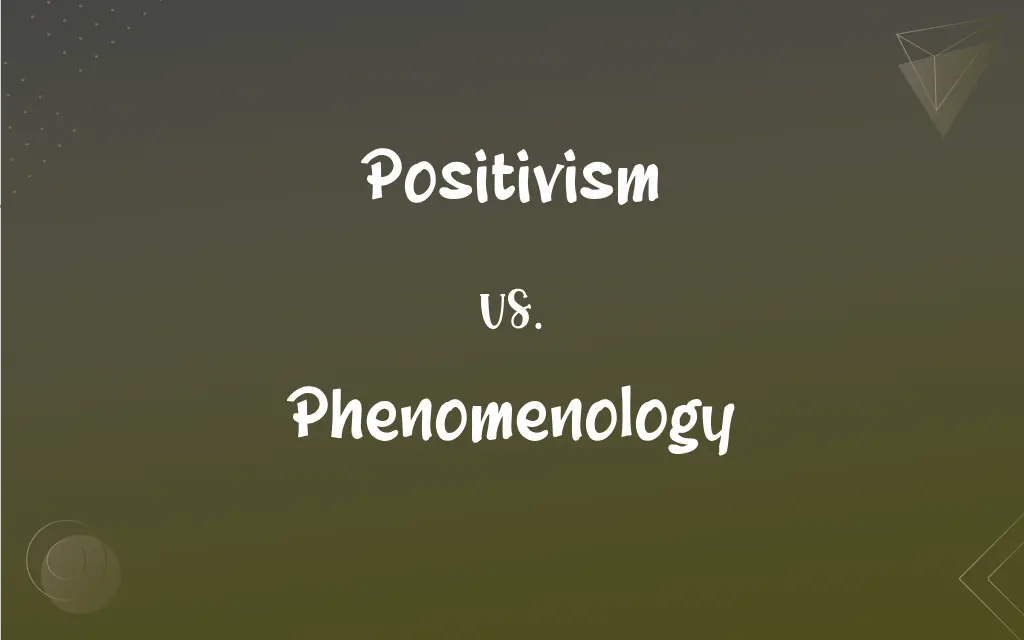Positivism vs. Phenomenology: What's the Difference?
By Harlon Moss || Updated on May 20, 2024
Positivism focuses on observable, objective reality and empirical evidence, while phenomenology emphasizes subjective experiences and the meaning individuals give to those experiences.

Key Differences
Positivism is a philosophical approach that prioritizes empirical data and scientific methods to understand reality. It posits that knowledge is derived from observable phenomena and aims to uncover universal laws. Phenomenology, on the other hand, centers on individual perceptions and experiences. It seeks to explore how people make sense of the world through their subjective experiences.
Positivism relies on quantifiable data and often uses experiments and statistical analysis to test hypotheses. This approach values objectivity and aims to eliminate bias. Phenomenology emphasizes understanding the essence of experiences from the first-person perspective. It uses methods like in-depth interviews and personal narratives to gather rich, qualitative data.
In positivism, researchers strive for detachment from the subject matter to ensure unbiased results. This involves using controlled conditions and standardized procedures. Phenomenology, conversely, involves researchers immersing themselves in the participants' experiences to grasp their meaning and significance. This approach acknowledges the researcher's influence on the study.
Positivism is often applied in natural and social sciences to predict and control phenomena. It values precision, reliability, and generalizability of findings. Phenomenology is frequently used in fields like psychology, sociology, and education to understand complex human behaviors and interactions. It values depth, context, and the uniqueness of individual experiences.
Comparison Chart
Focus
Objective reality and empirical evidence
Subjective experiences and meanings
ADVERTISEMENT
Methodology
Quantitative methods, experiments, statistics
Qualitative methods, in-depth interviews
Researcher's Role
Detached and objective
Immersed and subjective
Application
Natural and social sciences
Psychology, sociology, education
Goal
Predict and control phenomena
Understand complex human behaviors
Positivism and Phenomenology Definitions
Positivism
The belief in objective reality.
Positivism asserts that reality exists independently of human perception.
ADVERTISEMENT
Phenomenology
An approach emphasizing first-person perspectives.
Phenomenology values the richness of personal narratives.
Positivism
A focus on observable phenomena.
Positivism investigates only what can be seen and measured.
Phenomenology
A philosophy focusing on subjective experiences.
Phenomenology examines how individuals perceive and interpret their experiences.
Positivism
An approach emphasizing scientific methods.
In positivism, hypotheses are tested using rigorous statistical analyses.
Phenomenology
A method involving qualitative data.
Phenomenology uses interviews to gather in-depth insights.
Positivism
A method aimed at discovering universal laws.
Researchers use positivism to uncover general principles governing behavior.
Phenomenology
The study of conscious experiences.
Phenomenology seeks to understand the essence of lived experiences.
Positivism
A doctrine contending that sense perceptions are the only admissible basis of human knowledge and precise thought.
Phenomenology
A focus on the meaning individuals give to their experiences.
Phenomenology explores how people make sense of their life events.
Positivism
The application of this doctrine in logic, epistemology, and ethics.
Phenomenology
A philosophy or method of inquiry concerned with the perception and experience of objects and events as the basis for the investigation of reality.
Positivism
The system of Auguste Comte designed to supersede theology and metaphysics and depending on a hierarchy of the sciences, beginning with mathematics and culminating in sociology.
Phenomenology
A philosophical movement based on this, originated by Edmund Husserl around 1905.
Positivism
Any of several doctrines or viewpoints, often similar to Comte's, that stress attention to actual practice over consideration of what is ideal
"Positivism became the 'scientific' base for authoritarian politics, especially in Mexico and Brazil" (Raymond Carr).
Phenomenology
(philosophy) The study of structures of consciousness as experienced from the first-person point of view.
Positivism
The state or quality of being positive.
Phenomenology
(philosophy) A movement based on this, originated about 1905 by Edmund Husserl.
Positivism
(philosophy) A doctrine that states that the only authentic knowledge is scientific knowledge, and that such knowledge can only come from positive affirmation of theories through strict scientific method, refusing every form of metaphysics.
Phenomenology
(medicine, philosophy of medical sciences) An approach to clinical practice which places undue reliance upon subjective criteria such as signs and symptoms, while ignoring objective etiologies in the formulation of diagnoses and in the compilation of a formal nosologies.
Positivism
(legal) A school of thought in jurisprudence in which the law is seen as separated from moral values; i.e. the law is posited by lawmakers (humans).
Phenomenology
(physics) The use of theoretical models to make predictions that can be tested through experiments.
Positivism
A system of philosophy originated by M. Auguste Comte, which deals only with positives. It excludes from philosophy everything but the natural phenomena or properties of knowable things, together with their invariable relations of coexistence and succession, as occurring in time and space. Such relations are denominated laws, which are to be discovered by observation, experiment, and comparison. This philosophy holds all inquiry into causes, both efficient and final, to be useless and unprofitable.
Phenomenology
A description, history, or explanation of phenomena.
Positivism
The form of empiricism that bases all knowledge on perceptual experience (not on intuition or revelation)
Phenomenology
A philosophical doctrine proposed by Edmund Husserl based on the study of human experience in which considerations of objective reality are not taken into account
Positivism
A quality or state characterized by certainty or acceptance or affirmation
Positivism
A philosophy prioritizing empirical evidence.
Positivism requires that all claims be verified through observation or experimentation.
FAQs
What kind of data does phenomenology prioritize?
Phenomenology prioritizes qualitative data, often gathered through in-depth interviews.
How do positivist researchers view their role?
Positivist researchers strive for detachment and objectivity to ensure unbiased results.
What is the main focus of positivism?
Positivism focuses on observable, objective reality and empirical evidence.
How does phenomenology differ in its approach?
Phenomenology emphasizes subjective experiences and the meanings individuals assign to them.
What is the goal of positivist research?
The goal of positivist research is to discover universal laws and generalizable findings.
What methods are commonly used in positivism?
Positivism commonly uses quantitative methods, experiments, and statistical analysis.
Where is positivism typically applied?
Positivism is typically applied in natural and social sciences to predict and control phenomena.
What is the positivist view on reality?
Positivism asserts that reality exists independently of human perception.
What is the researcher's role in phenomenology?
In phenomenology, researchers immerse themselves in the participants' experiences to understand their perspectives.
What is a common critique of positivism?
A common critique of positivism is that it may overlook the subjective and nuanced aspects of human experiences.
What does phenomenology seek to understand?
Phenomenology seeks to understand the essence of complex human behaviors and interactions.
How does phenomenology view reality?
Phenomenology views reality as constructed through individual experiences and interpretations.
What kind of insights does phenomenology aim to gather?
Phenomenology aims to gather in-depth insights into personal and subjective experiences.
In which fields is phenomenology most commonly used?
Phenomenology is most commonly used in psychology, sociology, and education.
What is a key characteristic of phenomenological research?
A key characteristic of phenomenological research is its focus on the lived experiences of individuals.
What is the nature of data in positivism?
Data in positivism is typically quantitative and structured.
What is a common critique of phenomenology?
A common critique of phenomenology is that it may lack generalizability and be too focused on individual perspectives.
What type of evidence is valued in positivism?
Positivism values empirical evidence that can be observed and measured.
How does positivism handle hypotheses?
Positivism tests hypotheses using rigorous scientific methods and statistical analyses.
How is data treated in phenomenology?
Data in phenomenology is treated qualitatively, focusing on richness and depth.
About Author
Written by
Harlon MossHarlon is a seasoned quality moderator and accomplished content writer for Difference Wiki. An alumnus of the prestigious University of California, he earned his degree in Computer Science. Leveraging his academic background, Harlon brings a meticulous and informed perspective to his work, ensuring content accuracy and excellence.































































